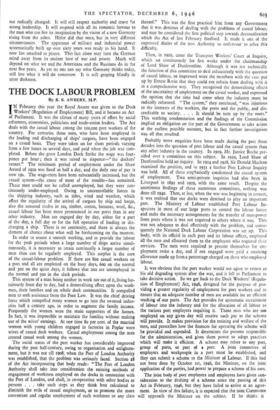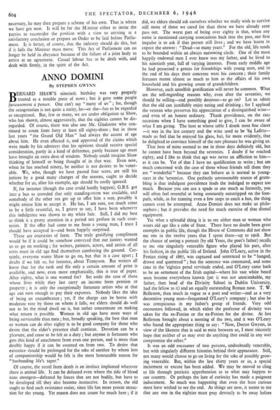THE DOCK LABOUR PROBLEM
By S. S. AWBERY, M.P.
IN February this year the Royal Assent was given to the Dock Workers' (Regulation of Employment) Bill, and it became an Act of Parliament. It was the climax of many years of effort by social reformers, economists, politicians and trade-union leaders. The Act deals with the casual labour among the too,000 port workers of the country. For centuries these men, who have been employed in the loading and discharging of ships' cargoes, have been engaged on a casual basis. They were taken on for short periods varying from a few hours to several days, and paid when the job was com- pleted. Before the great London Dock Strike the wage was four- pence per hour ; then it was raised to sixpence—" the dockers' tanner." The minimum period of employment under the Shaw Award of 1920 was fixed as half a day, and the daily rate of pay is now 19s. The wage-rates have been substantially increased, but the casual system—the cause of most of the trouble—has remained. These men could not be called unemployed, but they were con- tinuously under-employed. Owing to uncontrollable forces in the shipping industry, such as tides, wind and weather, which affect the regularity of the arrival of cargoes by ship and barge, also the seasonal trades in tea, timber, cotton, bananas, wool, &c., casual labour has been more pronounced in our ports than in any other industry. Men are engaged day by day, either for a part of the day, a full day or for the full operation of loading or dis- charging a ship. There is no continuity, and there is always the element of chance about what will be forthcoming on the morrow.
In order to assure a smooth working, and to provide the labour for the peak periods when a large number of ships arrive simul- taneously, it is necessary to tetain continually a larger number of men than can be regularly employed. This surplus is the core of the casual-labour problem. If there are 800 casual workers on a port and all are employed on the busy days, 600 on the normal and 300 on the quiet days, it follows that 200 are unemployed in the normal and 500 in the slack periods.
This system of a man being neither in work nor out of it, living for- tuitously from day to day, had a demoralising effect upon the work- men, their families and on whole dock communities. It compelled men to seek assistance from the Poor Law. It was the chief driving force which compelled many women to go into the sweated indus- tries half a century ago, in order to augment the family income. Frequently the women were the main supporters of the homes. In fact, it was impossible to maintain the families without making use of the wives' earnings. At one time 8o per cent. of the married women with young children engaged in factories in Poplar were wives of casual dock workers. Casual employment among the men created casual work among the women.
The social status of the port worker has considerably improved during the past half-century, owing to organisation and enlighten- ment, but it was not till 1908, when the Port of London Authority was established, that the problem was seriously faced. Section 28 of the Act incorporating that body reads: "The Port of London Authority shall take into consideration the existing methods of engagement of workmen employed on the docks in connection with the Port of London, and shall, in co-operation with other bodies or persons . . . take such steps as they think best calculated to diminish the evils of casual employment, or to promote the more convenient and regular employment of such workmen or any class
thereof." This was the first practical hint from any Government that it was desirous of dealing with the problems of casual labour, and may be considered the first political step towards decasualisation which the Act of last February finalised. It made it one of the expressed duties of the new Authority to endeavour to solve this difficulty.
Then, in 1920, came the Transport Workers' Court of Inquiry, which sat continuously for five weeks under the chairmanship of Lord Shaw of Dunfermline. Although it was not technically the function of this committee to deal exhaustively with the question of casual labour, so impressed were the members with the case put up by Ernest Bevin that they could not refrain from dealing with it in a comprehensive way. They recognised the demoralising effects of the uncertainty of employment on the casual worker, and expressed the opinion that the time had come when the industry must be radically reformed. "The system," they continued, "was injurious to the interests of the workers, the ports and the public, and dis- creditable to society. . . . It should be torn up by the roots." This scathing condemnation and the findings of the Commission implied an obligation on the part of the Government to take action at the earliest possible moment, but in fact further investigation was all that resulted.
Probably more enquiries have been made during the past three decades into the question of port labour and the casual system than any other industry in the country. In 1919, Mr. Justice Roche pre- sided over a committee on this subject. In 1920, Lord Shaw of Dunfermline held an inquiry. In 1924 and 1928, Sir Donald Maclean examined the position, and in 1931 a further Port Labour Inquiry was held. All of these emrhatically condemned the casual system of employment. Two semi-private inquiries had also been in Liverpool in 1892 and 1929, with the same result. Despite the unanimous findings of these numerous committees, nothing was done till 5940. Then, at last, when the war was beginning in earnest, it was realised that our docks were destined to play an important part. The Ministry of Labour established Port Labour In- spectors in most of our large ports to control the labour forces and make the necessary arrangements for the transfer of man-power from ports where it was not required to others where it was. This was not adequate to deal effectively with the problem, and conse- quently the National Dock Labour Corporation was set up. This body, with its official in each port and its labour officer, employed all the men and allocated them to the employers who required their services. The men were required to present themselves for em- ployment twice a day, and if not engaged were paid a retaining allowance made up from a percentage charged on those who employed labour.
It was obvious that the port worker would not agree to return to his old degrading system after the war, and it fell to Parliament to take decisive action. So we get back to the Dock Workers' (Regula- tion of Employment) Act, 1946, designed for the purpose of pro- viding a greater regularity of employment for port workers and to ensure that an adequate number of men are available for an efficient working of our ports. The Act provides for systematic recruitment of labour into the industry and for the allocation of all labour to the various port employers requiring it. Those men who are not employed on any given day will receive such pay as the scheme will provide. It makes provision for the training and welfare of the men, and prescribes how the finances for operating the scheme will be provided and expended. It determines the persons responsible for the administration, and gives them power to adopt practices which will make it efficient. A scheme may relate to any port, group of ports, or part of a port. A joint committee of employers and workpeople in a port must be established, and they can submit a scheme to the Minister of Labour. If this had not been done by October 1st, i946, the Minister, on the joint application of the parties, had power to prepare a scheme of his own.
The joint body of port employers and employees have given con- sideration to the drafting of a scheme since the passing of this Act in February, 1946, but they have failed to arrive at an agree- ment. In view of this failure, it is expected that the joint Committee will approach the Minister on the subject. If he thinks it necessary, he may then prepare a scheme of his own. That is where we have got now. It will be for the M:nister either to invite the parties to reconsider the position with a view to arriving at a satisfactory conclusion or prepare an Order to be laid before Parlia- ment. It is better, of course, that the industry should do this, but if it fails the Minister must move. This Act of Parliament can no longer be held in abeyance because of the failure of a joint body to arrive at an agreement. Casual labour has to be dealt with, and dealt with firmly, in the spirit of the Act.



































 Previous page
Previous page